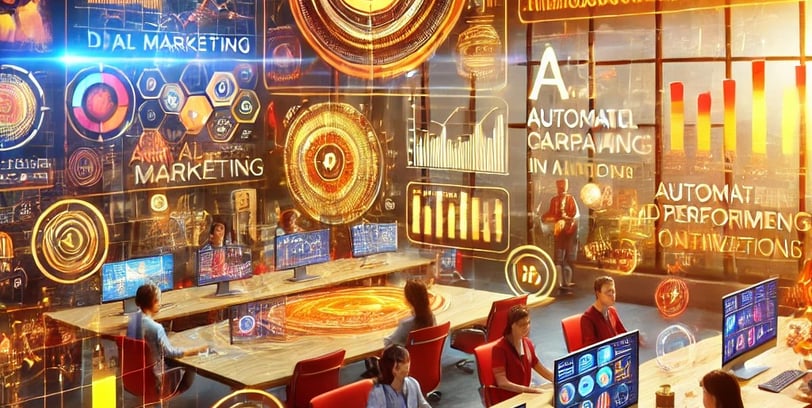How AI is Revolutionizing Digital Marketing: Trends & Tools
Discover how AI is transforming digital marketing. Learn about key trends, top AI tools, and strategies to enhance personalization, SEO, content creation, and advertising for 2025 and beyond.
1/16/20254 min read


Introduction
Artificial Intelligence (AI) is reshaping the digital marketing landscape, making it more efficient, data-driven, and personalized. As businesses strive to enhance customer experiences and maximize marketing ROI, AI-powered tools are becoming indispensable. From predictive analytics to content automation, AI enables marketers to optimize their strategies, target audiences with precision, and drive higher conversions.
AI has revolutionized digital marketing by improving the ability to analyze customer behavior, automate tedious processes, and create personalized experiences at scale. With AI-driven insights, businesses can make informed decisions, improve engagement, and stay ahead of competitors. In this guide, we’ll explore how AI is transforming digital marketing, the latest trends shaping the industry, and the must-have AI tools that businesses should leverage in 2025.
How AI is Changing Digital Marketing
1. Personalization at Scale
AI enables hyper-personalized marketing campaigns by analyzing vast amounts of user data. AI algorithms track customer behavior, preferences, and interactions across multiple channels, allowing businesses to deliver highly relevant content, recommendations, and offers.
For instance, AI-driven recommendation engines, such as those used by Amazon and Netflix, suggest products and content based on past user activity, significantly increasing engagement and conversion rates. Additionally, AI-driven email marketing platforms, such as ActiveCampaign and Mailchimp AI, personalize subject lines, email content, and send times to maximize open rates and engagement.
AI also allows businesses to create dynamic websites that adjust content in real time based on user behavior, further improving customer experience and boosting conversions. Personalized marketing powered by AI ensures that businesses engage with the right customers at the right time, leading to improved brand loyalty and revenue growth.
2. AI-Powered Predictive Analytics
Predictive analytics uses AI and machine learning to analyze historical data and forecast future trends. Marketers can use this data to anticipate customer needs, optimize pricing strategies, and tailor their campaigns accordingly. AI-driven analytics tools, like Google Analytics AI and HubSpot AI, help businesses identify patterns and trends that would be difficult to detect manually.
AI-powered predictive analytics enables businesses to forecast customer purchasing behavior, optimize advertising spend, and prevent customer churn by identifying at-risk customers. Retailers, for example, can use predictive AI to manage inventory effectively, ensuring that they stock products based on demand forecasts, thereby reducing waste and increasing sales.
3. Chatbots and Conversational Marketing
AI-powered chatbots have become essential for businesses looking to provide 24/7 customer service and engagement. Tools like ChatGPT, Drift, and Intercom enable real-time interactions with potential customers, answering inquiries, providing recommendations, and even processing transactions.
Conversational marketing enhances user experiences by allowing brands to interact with customers in a natural, engaging manner, leading to increased satisfaction and sales. AI-driven chatbots can personalize conversations based on past interactions, provide multilingual support, and seamlessly integrate with customer relationship management (CRM) systems, improving lead generation and customer retention.
Additionally, AI chatbots can qualify leads, schedule appointments, and guide customers through the sales funnel, saving businesses time and ensuring that prospects receive the support they need instantly.
4. Automated Content Creation
AI is revolutionizing content marketing by generating high-quality blog posts, social media updates, and ad copies. Platforms like Jasper AI, Copy.ai, and Writesonic use AI to create compelling content in seconds. These tools help marketers scale content production without compromising quality, saving time and resources.
AI can also assist in content curation, ensuring businesses share relevant and timely articles, blog posts, and news stories with their audience. AI-powered tools can analyze trending topics and suggest content ideas that align with customer interests, increasing engagement and brand authority.
5. AI in SEO & Search Optimization
Search engines, including Google, now use AI algorithms such as RankBrain and BERT to better understand search intent and deliver relevant results. AI-powered SEO tools like Surfer SEO, Clearscope, and SEMRush AI help businesses optimize their content based on search trends, competitor analysis, and real-time keyword insights.
AI-driven SEO tools can identify keyword opportunities, suggest metadata improvements, and analyze backlink profiles, allowing businesses to refine their search engine optimization strategies. AI also plays a crucial role in voice search optimization, helping businesses adjust their content for queries made through smart assistants like Siri, Alexa, and Google Assistant.
6. AI-Powered Advertising & PPC Optimization
AI enhances paid advertising by automating campaign management, bid adjustments, and audience targeting. Google Ads and Facebook Ads leverage AI to optimize ad placements, ensuring businesses get the highest return on investment (ROI). Platforms like Adzooma and Pattern89 help businesses optimize ad performance using AI insights.
AI-driven ad targeting enables businesses to create hyper-targeted campaigns that reach the right audience based on demographics, interests, and online behavior. Additionally, AI-powered A/B testing tools can test multiple ad variations in real time to determine which version performs best, maximizing conversions while minimizing ad spend.
7. Visual & Voice Search Optimization
As voice search and image recognition technologies grow, businesses must adapt their digital marketing strategies. AI tools like Google Lens and Amazon Alexa AI allow brands to optimize for visual and voice searches, ensuring their products and services appear in AI-driven search results.
Voice search optimization requires businesses to adjust their content strategy to match conversational queries, while visual search allows customers to find products using images rather than text-based searches. AI ensures that businesses stay visible in search results, regardless of how consumers interact with digital platforms.
Conclusion
AI is revolutionizing digital marketing, offering businesses smarter ways to engage with audiences, optimize campaigns, and maximize ROI. From AI-powered chatbots and predictive analytics to content automation and SEO optimization, AI tools are reshaping how businesses market their products and services. By staying ahead of AI trends and leveraging the right tools, businesses can position themselves for success in the evolving digital landscape.